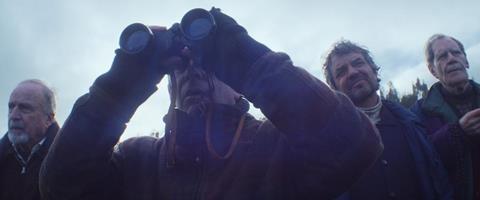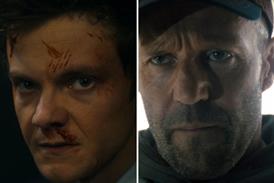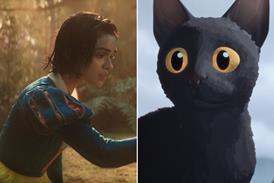Dir: Pablo Larrain. Chile. 2015. 98mins

One thing missing in Pablo Larrain’s new movie is a touch of Luis Bunuel. Without it, the fierce sarcastic attack he launches against the Catholic Church looks a little too much like a self-motivated settling of accounts, terribly angry and lacking a perspective that would put it all into the right context. The frequent scandals the Church has been involved recent years leaves no doubt that Larrain is not barking at the wrong tree, but, as it was the case in such earlier films as Tony Manero and then Post Mortem, he is too easily tempted into looking down on his protagonists and showering them with ridicule, even if they might fully deserve it.
The Club (El Club) is wrapped in a kind of murky mist that somehow reflects the moral state of his protagonists.
The ‘Club’ of the title refers to a house on the beach of a dilapidated little Chilean town, used by the Church to put out to pasture the disaffected priests who have strayed from the “path of sanctity” one way or another and need to be hidden away from the eyes of the world.
Living in a kind of open prison with restrictions that should prevent them falling into temptation once again, they are cared for by former nun Mother Monica (Antonia Zegers) who looks upon them, all men of 40 and more, as her wayward children that should be kept in line with a firm hand. With most of the day devoted to prayers, singing and purging their sins or at least not displaying them in public, they are left with plenty of free time on their hands to race a greyhound they have found on the street and adopted as their pet.
The house on the hill is shaken out of its peaceful complacency when Father Lazcano (Jose Soza), another sinful priest, arrives, but is followed by one of his early victims, a homeless vagabond who calls himself Sandokan (Roberto Farias), once an altar boy deflowered at the time by the priest, who has never quite recovered.
Shocked by this unexpected presence and faced by the sins of the past, Father Lazcano shoots himself in the head, and the Church sends one of its specialised henchmen to investigate the case before the onset of yet another scandal. Predictably enough, the investigation shows the reputation deserves to be besmirched, all of the inmates of the club lying and inventing excuses to justify themselves, but at the same time, every one of the culprits - including the investigator - will gladly sin again to keep the stench under cover.
Larrain’s cast are often regulars in his films before and therefore know his intentions, fitting easily into his furiously caricatured characters, whom he evidently doesn’t like, believe or feel like sympathising with. Shot mostly against the light as if to hide their features in the shadows, The Club (El Club) is wrapped in a kind of murky mist that somehow reflects the moral state of his protagonists. Unlike his early films, dealing exclusively with past Chilean politics, this time, given the long arm of the Church, Larrain’s theme is indeed universal. But heavy dialogue spiced with sardonic remarks about the hypocrisy of organised faith may make it difficult for it to break out of the art house circuit.
Production companies: Fabula, Santiago de Chile
International Ssales: Funny Balloons, contact@funny-balloons.com
Producers: Juan de Dios Larrain
Screenplay: Guillermo Calderon, Daniel Villalobos, Pablo Larrain
Cinematography: Sergio Armstrong
Editor: Sebastian Sepulveda
Production designer: Estefania Larrain
Main cast: Roberto Farrias, Alfredo Castro, Antonia Zegers, Jaime Vadell, Alejandro Goic, Alejando Sieveking, Marcelo Alonso, JoseSoza, Francisco Reyes




















